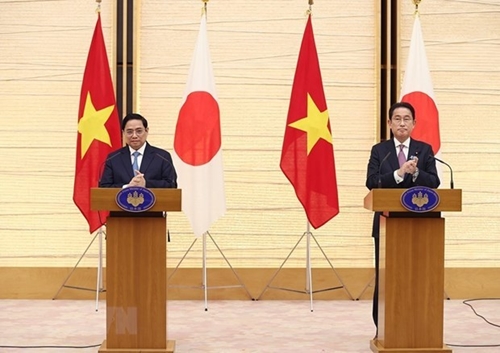The diplomat told the Vietnam News Agency (VNA) that the official visit is significance as it marked a milestone in the relationship and affirmed the resolve of the two countries’ leaders to open up a new page of the “Extensive Strategic Partnership for Peace and Prosperity in Asia” between Vietnam and Japan.
During the visit, Kishida had meetings with Vietnamese key leaders, including Party General Secretary Nguyen Phu Trong, President Nguyen Xuan Phuc, Prime Minister Pham Minh Chinh and National Assembly Chairman Vuong Dinh Hue.
    |
 |
|
Japanese Prime Minister Kishida Fumio (right) and his Vietnamese counterpart Pham Minh Chinh |
Their good personal sentiments are likely to create a firm foundation for the long-term development of the friendship and cooperation between the two countries and peoples, Nam said.
Economic cooperation was the main focus of the talks between the leaders, he said, adding that a total of 23 important documents were reached during the visit, covering economy-trade, science-technology, transportation, digital transformation and innovation.
The two sides laid an emphasis on priority cooperation spheres – the diversification of sources of supply, digital transformation and technological renovation. The Japanese government pledged to support 39 firms operating in these fields.
Meanwhile, the Vietnamese side was interested in new-generation official development assistance (ODA) with high incentives and streamlined, flexible procedures in strategic infrastructure in transport, climate change response, digital transformation, and health care.
In their meetings, both Vietnamese and Japanese leaders affirmed the significance of 2023 as the year marks the 50th anniversary of the bilateral diplomatic ties, and agreed to establish national organizing committees in charge of holding major celebration events.
Regarding political security, they consented to continue their close coordination at regional and international forums like the Association of Southeast Asian Nations (ASEAN), the East Asia Summit (EAS), the Asia-Pacific Economic Cooperation (APEC), the Asia-Europe Meeting (ASEM), the United Nations and the Mekong-Japan cooperation.
They will work together with other members to implement and expand the Comprehensive and Progressive Agreement for Trans-Pacific Partnership (CPTPP) and effectively realize the Regional Comprehensive Economic Partnership (RCEP).
The sides touched upon their common views on the settlement of disputes and differences by peaceful measures, including the respect for diplomatic and legal processes, and in accordance with international law, particularly the United Nations Convention on the Law of the Sea 1982 (UNCLOS 1982).
They also highlighted the comprehensive, full and effective implementation of the Declaration on the Conduct of Parties in the East Sea (DOC), soon reaching an effective and substantive Code of Conduct (COC) in line with international law.
The leaders were resolved to soon bring Vietnamese longan to Japan, paving waves for other fruits such as grape, grapefruit, avocado and rambutan to access the market.
Nam suggested Vietnamese businesses pay heed to longan quality, sterilization and post-harvest preservation and make plans to put the fruit on Japanese supermarket shelves next September.
Vietnam should pay more attention to high-tech agriculture and enhance production cooperation chains to churn out agricultural products that satisfy Japan’s requirements, he noted.
The ambassador held that the Vietnamese and Japanese economies have become increasingly reciprocal, and the number of Japanese firms in Vietnam is expected to rise in the time ahead.
To promote the bilateral ties, Nam stressed the need for the two countries to step up the communication work to educate their young generations about the heartfelt and trustworthy relationship.
Source: VNA